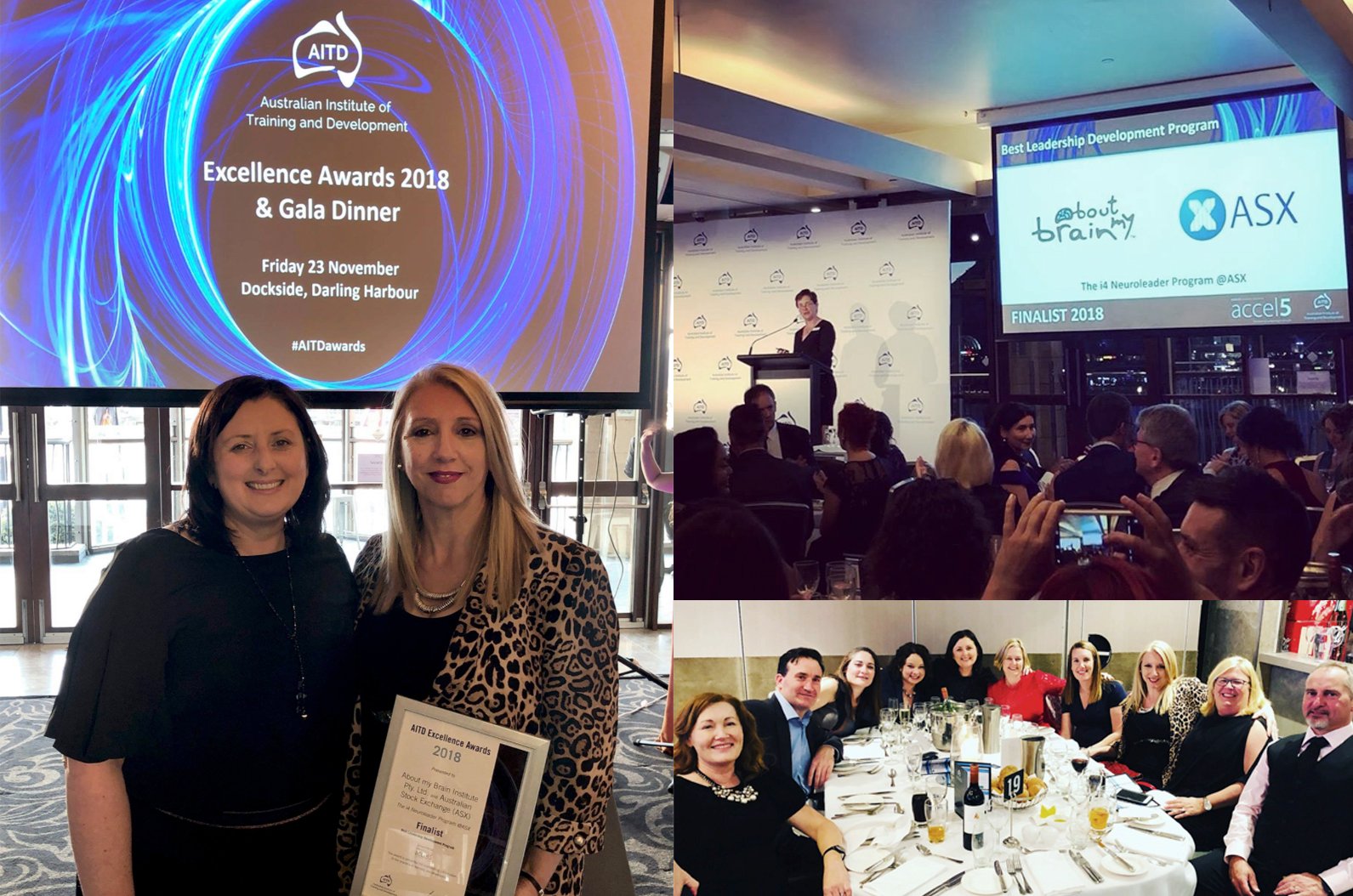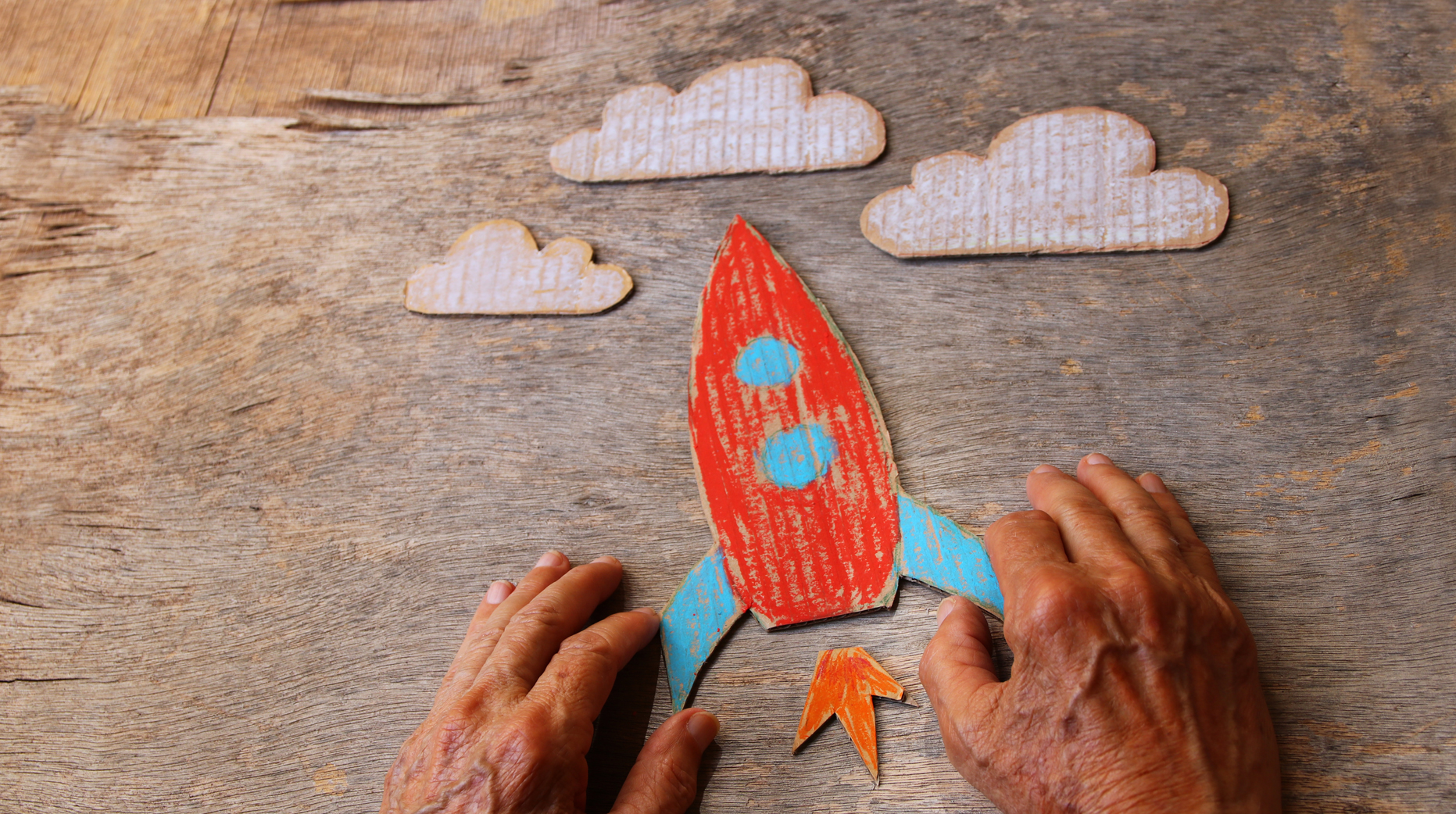Featured In ‘The 100% Human At Work’ Virgin Unite Initiative & Awarded Finalist in AITD’s Best Leadership Programs
A couple of years ago, Virgin Unite (the “entrepreneurial foundation” of Richard Branson’s Virgin Group) launched the ‘100% Human at Work Initiative’ because they believe the time has come for business to start thinking of people as human beings and not as resources.
Moving away from maximising profits and profitability to focus on how we can help people achieve their highest potential and purpose and driving positive change in the world. This will naturally positively impact the bottom line.
They produced an annual booklet that gathers the case studies of some inspirational companies in Australia & New Zealand that are doing just that Human At Work projects. We were approached to be one of these case studies with the work we have been doing with the Australian Stock Exchange and the i4 Neuroleader Program.
The Human At Work Experiments Collection is designed to inspire you to try new things and to explore new ways of working within your organisation.
Our ASX Case Study
The Challenge
In 2016 a thorough evaluation of the Leadership Development offering at ASX was conducted, which highlighted that the programs that had been offered for the past 8-10 years needed to change, due to an increasingly complex environment that's creating new demands on the leaders and the workforce.
To re-energise leadership development, a new set of capabilities was drafted to assist leaders to deliver the changes required in their 3-5 year plan. The solution required a blended approach to learning delivery and a robust evaluation methodology built into the program, designed at inception.
The Solution
ASX had an appetite to include neuroscience-based content into the design of their leadership development offering with the purpose of enticing an already ‘highly sophisticated group’. They were looking for something fresh and cutting-edge but that could also work well with all levels within the organisation.
The About my Brain Institute proposed to use the ‘i4 Neuroleader Model’ as the basis for the program and focus on the development of the competencies of performance, collaboration, innovation and agility. These competencies went beyond the traditional management/leadership abilities that ASX was looking for.
We knew that exploring the science of the pillars of the model such as integration, inspiration, imagination and intuition, amongst others, would set us apart from any other provider and offer a new lens to look at leadership.
Understanding the neuroscience of these competencies and learning a practical path of how to implement them at work (and also in life) was compelling enough to bring on board even the most skeptical participants.
ASX looked at several providers, but the i4 Neuroleader Program offering really struck a chord for them. The i4 Neuroleader Methodology is a set of concepts and practices that combines years of research conducted by scientist and leadership expert, Silvia Damiano.
Silvia founded the About my Brain Institute with the purpose of democratising leadership and neuroscience for the new era of work. The methodology has been tested thoroughly and used to train more than 600 coaches and consultants from around the world.
The Results
The About my Brain Institute has rolled out the i4 Neuroleader Program across ASX's Executive & Senior Leaders group in three different cohorts for a period of eight months each. The results were overwhelmingly positive and because of this, after two and a half years of rolling out this initiative and after a strenuous submission process, the program was nominated as one of the best Leadership Programs in the industry by the Australian Institute of Training & Development.

The summary of feedback has highlighted key points such as: learning the importance of understanding and optimising brain function for better leadership. The use of a 720 assessment (the i4 Neuroleader Assessment), which allowed participants to choose up to 20 raters not only from work but from their personal life, created an environment of ‘embracing vulnerability’.
This led to an increase of trust levels and a sense of camaraderie, critical aspects to take into account when developing a more collaborative (and less hierarchical) culture. Participants understood the importance of taking care of themselves as ‘human beings’ as the first pillar of achieving higher levels of performance at work, and many developed practices like better sleep & nutrition, mindfulness, meditation with neurofeedback devices and the practice of frequent exercise.
This helped them learn how to manage their minds rather than their time. The program also explored intuition (including gut health) for agile leadership and the neurobiology of creativity. Understanding the science behind imagination, creativity and innovation allowed leaders to listen more actively to the ideas of their team members and to know how to support them in their implementation.
The results were better delegation, more clarity of thinking and an increased capacity to manage stress and deal with competing priorities, a day-to-day occurrence at ASX due to the continuous demands from regulators and clients.
Being able to diagnose the current state of the competencies of performance, collaboration, innovation and agility by using the 720 i4 Neuroleader Assessment and remeasuring after eight months was an effective way to show strengths, limitations and progress to each individual and to the organisation. The assessment was accompanied by a self-paced 10 hour online coaching program that participants could explore at their leisure.
ASX Testimonials
As a result of this program I have become less stressed and a more confident leader, consequently I feel more inspired and this helps me inspire my team.
SENIOR LEADER, TECHNOLOGY
This is the best leadership program I have ever attended, because it is so different to anything else. We have learnt the importance of taking care of oneself, reflecting, imagining and being positive. If we want to lead in a complex world, we need to develop these abilities.
EXECUTIVE OPERATION
- i4 Neuroleader (353)
- Leadership & Culture (336)
- Brain Health & Wellbeing (206)
- Innovation (97)
- Performance (85)
- Our News (79)
- Collaboration (68)
- Agility (53)
- Practitioner Stories (44)
- In The Press (36)
- Make Me A Leader (33)
- Balance (31)
- Integration (30)
- Imagination (29)
- Awareness (23)
- Brain-Friendly Channel (22)
- Brain-Friendly Leadership (22)
- Communication (22)
- Curiosity (21)
- Inspiration (19)
- Intuition (19)
- Attitude (17)
- Courage (16)
- Adaptability (14)
- Case Studies (14)
- Drive (14)
- Generosity (13)
- Ethics (9)
- Mental Readiness (9)
- Influence (8)
- Retreat (8)
- Brain-Friendly Leadership (1)
- Oracle Cards (1)
- 1 November 2025 (2)
- 1 September 2025 (3)
- 1 August 2025 (5)
- 1 July 2025 (5)
- 1 June 2025 (2)
- 1 April 2025 (1)
- 1 March 2025 (8)
- 1 February 2025 (3)
- 1 September 2024 (4)
- 1 July 2024 (2)
- 1 June 2024 (6)
- 1 May 2024 (2)
- 1 April 2024 (3)
- 1 March 2024 (1)
- 1 November 2023 (1)
- 1 August 2023 (1)
- 1 July 2023 (2)
- 1 June 2023 (2)
- 1 May 2023 (4)
- 1 April 2023 (2)
- 1 March 2023 (7)
- 1 February 2023 (4)
- 1 January 2023 (1)
- 1 September 2022 (1)
- 1 May 2022 (3)
- 1 April 2022 (1)
- 1 March 2022 (5)
- 1 February 2022 (4)
- 1 January 2022 (4)
- 1 December 2021 (2)
- 1 November 2021 (4)
- 1 October 2021 (3)
- 1 September 2021 (6)
- 1 August 2021 (1)
- 1 April 2021 (1)
- 1 December 2020 (2)
- 1 November 2020 (1)
- 1 September 2020 (1)
- 1 August 2020 (1)
- 1 July 2020 (3)
- 1 June 2020 (4)
- 1 May 2020 (3)
- 1 April 2020 (4)
- 1 March 2020 (6)
- 1 February 2020 (4)
- 1 January 2020 (2)
- 1 December 2019 (3)
- 1 November 2019 (3)
- 1 October 2019 (5)
- 1 September 2019 (4)
- 1 August 2019 (4)
- 1 July 2019 (4)
- 1 June 2019 (5)
- 1 May 2019 (9)
- 1 April 2019 (9)
- 1 March 2019 (8)
- 1 February 2019 (7)
- 1 January 2019 (8)
- 1 December 2018 (5)
- 1 November 2018 (10)
- 1 October 2018 (16)
- 1 September 2018 (9)
- 1 August 2018 (10)
- 1 July 2018 (9)
- 1 June 2018 (8)
- 1 May 2018 (9)
- 1 April 2018 (9)
- 1 March 2018 (9)
- 1 February 2018 (8)
- 1 January 2018 (8)
- 1 December 2017 (6)
- 1 November 2017 (9)
- 1 October 2017 (9)
- 1 September 2017 (8)
- 1 August 2017 (10)
- 1 July 2017 (8)
- 1 June 2017 (8)
- 1 May 2017 (9)
- 1 April 2017 (8)
- 1 March 2017 (6)
- 1 January 2017 (3)
- 1 December 2016 (4)
- 1 November 2016 (5)
- 1 October 2016 (4)
- 1 September 2016 (2)
- 1 August 2016 (4)
- 1 July 2016 (4)
- 1 June 2016 (2)
- 1 May 2016 (3)
- 1 April 2016 (3)
- 1 March 2016 (7)
- 1 February 2016 (2)
- 1 January 2016 (5)
- 1 December 2015 (2)
- 1 November 2015 (2)
- 1 October 2015 (4)
- 1 September 2015 (2)
- 1 August 2015 (2)
- 1 July 2015 (1)
- 1 June 2015 (3)
- 1 May 2015 (4)
- 1 April 2015 (5)
- 1 March 2015 (3)
- 1 February 2015 (3)
- 1 January 2015 (3)
- 1 December 2014 (3)
- 1 November 2014 (3)
- 1 October 2014 (3)
- 1 September 2014 (5)
- 1 August 2014 (4)
- 1 July 2014 (5)
- 1 June 2014 (3)
- 1 May 2014 (1)
- 1 March 2014 (1)
- 1 December 2013 (2)
- 1 November 2013 (1)
- 1 July 2013 (1)
- 1 June 2013 (1)
- 1 May 2013 (3)
- 1 April 2013 (1)
- 1 March 2013 (2)
- 1 February 2013 (1)
- 1 January 2013 (2)
- 1 November 2012 (1)
- 1 October 2012 (1)
- 1 September 2012 (1)
- 1 August 2012 (2)
- 1 July 2012 (1)
- 1 June 2012 (1)
- 1 May 2012 (2)
- 1 April 2012 (1)
- 1 February 2012 (1)
- 1 January 2012 (1)
- 1 November 2011 (1)
- 1 October 2011 (3)
- 1 September 2011 (2)
- 1 July 2011 (1)
- 1 June 2011 (1)
- 1 May 2011 (1)
- 1 April 2011 (1)
- 1 March 2011 (1)
- 1 February 2011 (2)
- 1 January 2011 (4)
- 1 December 2010 (4)
- 1 November 2010 (3)
- 1 October 2010 (5)
- 1 September 2010 (4)
- 1 August 2010 (4)
- 1 July 2010 (3)
- 1 June 2010 (4)
- 1 May 2010 (7)
- 1 April 2010 (5)
Subscribe by email
You May Also Like
These Related Stories

Building Resilient Teams In The Age Of AI: A Case For Brain-Friendly Leadership

New Leadership Model Vital For The 'Imagination Age'



No Comments Yet
Let us know what you think